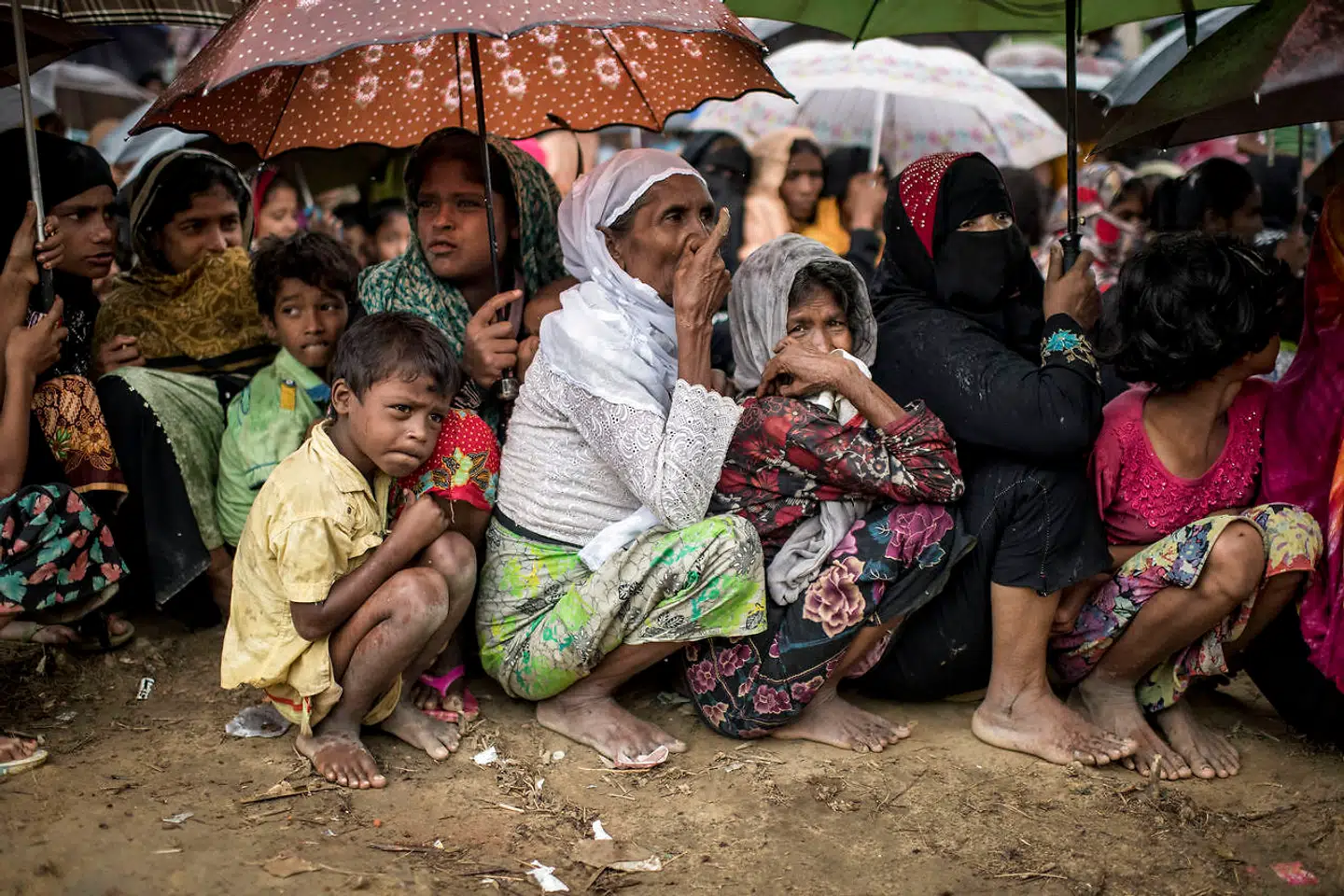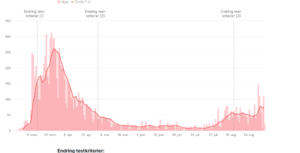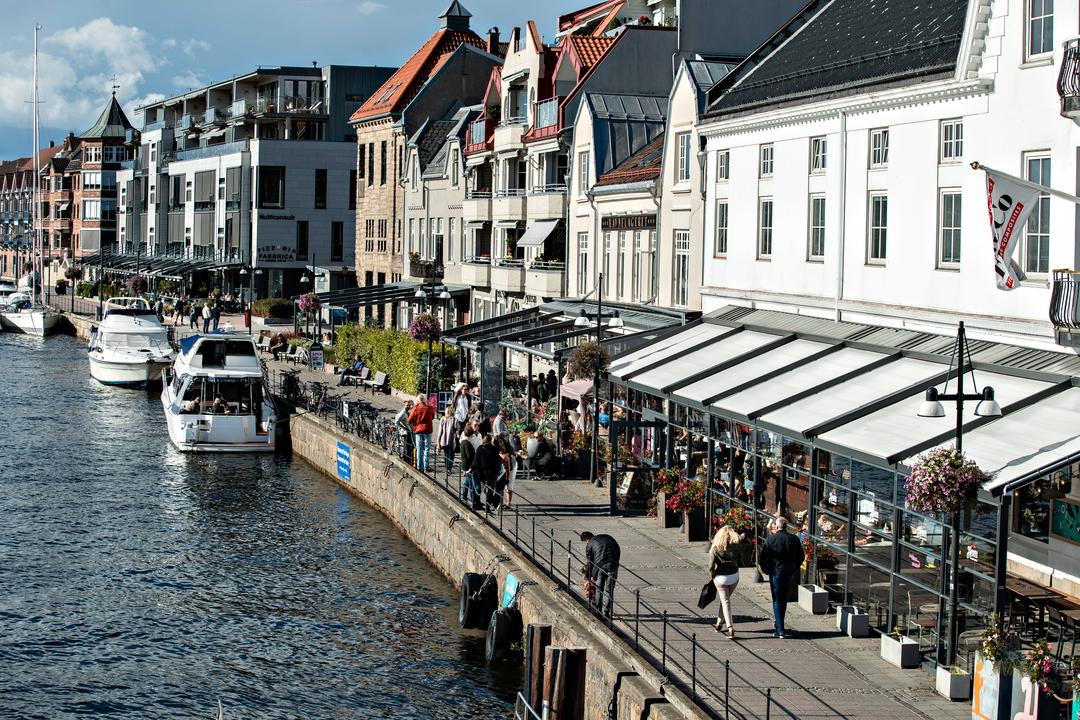Det er nevnt utallige ganger i tråden, f.eks. det er svært viktig å tilføre oksygen tidlig i sykdomsforløpet.Sverige har ikke vært kapasitetsbegrenset på behandling. De har til enhver tid hatt ca 20% ledig intensivkapasitet.
Og som MML har vært inne på - at man har blitt så mye bedre på å behandle er langt på vei en myte. De omtalte mirakelmedisinene virker ikke viser det seg. Remvivisir eller hvordan det nå staves funker ikke. Blodplasmaoverføring funker ikke. Malariademisinen funker ikke. Allerede helt fra starten overlevde over 80 prosent av alle som kom på intensiven i Norge. Leder for enheten på Rikshospitalet sier at det ikke er noe nytt behandlingsmessig - det er standard intensivmedisin. Overlevelsesprosentene for intensivpasienter i Sverige har heller ikke gått opp siden dette startet.
Eksakt hva er du mener man har blitt bedre på innen behandlingen? Vær gjerne svært konkret.
Medisin og helse Corona
- Trådstarter Disqutabel
- Startdato
Diskusjonstråd Se tråd i gallerivisning
-
- Ble medlem
- 19.09.2014
- Innlegg
- 23.685
- Antall liker
- 16.606
Men hvorfor er da overlevelsesprosenten statisk i Sverige? Hvorfor overlevde helt fra starten så mange av de sykeste i Norge?Det er nevnt utallige ganger i tråden, f.eks. det er svært viktig å tilføre oksygen tidlig i sykdomsforløpet.
gitt denne angivelig nye kunnskapen- hva skal skal man da gjøre? Stenge enda mere ned siden man angivelig er bedre på behandling?
Nevnt tidligere: i Sverige var det katastrofal mangel på smittevernsutstyr og kompetanse. De gamle fikk også bare lindrende behandling.Men hvorfor er da overlevelsesprosenten statisk i Sverige? Hvorfor overlevde helt fra starten så mange av de sykeste i Norge?
Du bagatelliserer dette uten å vite om langtidsskader og kapasiteten i helsevesenet. Sprenges kapasiteten så stiger også dødstallene.264 døde. Av til sammen 25179 fram til 03.08. På tide å ta det innover seg.
Jeg bagatelliserer ikke. Jeg unnlater derimot å overdrive. Stor forskjell.Du bagatelliserer dette uten å vite om langtidsskader og kapasiteten i helsevesenet. Sprenges kapasiteten så stiger også dødstallene.- Ble medlem
- 19.09.2014
- Innlegg
- 23.685
- Antall liker
- 16.606
Jeg snakker nå om intensivavdelingene. De eldste kommer stort sett aldri dit, hverken i Sverige eller i Norge fordi der ikke er noen vits. Det er du som påstår st man vet så mye mer nå, jeg lurer på helt konkret hva det er man vet, hvordan det forbedrer behandlingen (tallene sier noe annet) og hvilke konskekvenser denne nye kunnskapen bør få.Når man tar så lett på en smittsom sykdom så er det mer enn merkelig at man argumenterer for alkohol- og tobakksavgifter for å få ned livvstilsykdommer. Og vi kan ta med kreftbehandling også. F.eks. rammer prostatakreft stort sett mannfolk over 70, hvorfor skal vi bruke store ressurser på den sykdommen? De skal jo snart daue likevel.- Ble medlem
- 19.09.2014
- Innlegg
- 23.685
- Antall liker
- 16.606
Jeg registrer at viljen til å svare på spørsmålet er begrenset.Når man tar så lett på en smittsom sykdom så er det mer enn merkelig at man argumenterer for alkohol- og tobakksavgifter for å få ned livvstilsykdommer. Og vi kan ta med kreftbehandling også. F.eks. rammer prostatakreft stort sett mannfolk over 70, hvorfor skal vi bruke store ressurser på den sykdommen? De skal jo snart daue likevel.Vi gjør vårt beste for å behandle f.eks kreft. Men stenger ikke samfunnet.
Og hvor mange fler vil dø av kreft de neste årene, grunnet manglende undersøkelse, oppfølging og behandling grunnet hysteriet rundt korona?
Jeg orker ikke å dra frem alle linkene til dette.Jeg snakker nå om intensivavdelingene. De eldste kommer stort sett aldri dit, hverken i Sverige eller i Norge fordi der ikke er noen vits. Det er du som påstår st man vet så mye mer nå, jeg lurer på helt konkret hva det er man vet, hvordan det forbedrer behandlingen (tallene sier noe annet) og hvilke konskekvenser denne nye kunnskapen bør få.
Men vi har lært at oksygen tidlig er viktig, at steroider kan ha effekt, at blodoverføring som inneholder antistoffer kan ha en effekt. At man blir mer alvorlig syk med et lavt nivå av D vitamin.- Ble medlem
- 19.09.2014
- Innlegg
- 23.685
- Antall liker
- 16.606
Jeg antar du ikke ser ironien i at du mener detNår man tar så lett på en smittsom sykdom så er det mer enn merkelig at man argumenterer for alkohol- og tobakksavgifter for å få ned livvstilsykdommer. Og vi kan ta med kreftbehandling også. F.eks. rammer prostatakreft stort sett mannfolk over 70, hvorfor skal vi bruke store ressurser på den sykdommen? De skal jo snart daue likevel.
«Bare er å ta seg en løpetur i skogen» om det ikke er lov å spille fotball. Om man er i faresonen for en livsstilssykdom så er det vel bare å endre livsstil så er problemet borte?
Samfunnet i Norge har ikke vært stengt. Eller har det vært portforbud i Hades ?Vi gjør vårt beste for å behandle f.eks kreft. Men stenger ikke samfunnet.
Og hvor mange fler vil dø av kreft de neste årene, grunnet manglende undersøkelse, oppfølging og behandling grunnet hysteriet rundt korona?
Problemet er i hvertfall mindre, men det er også et lotteri, genene betyr mye.Jeg antar du ikke ser ironien i at du mener det
«Bare er å ta seg en løpetur i skogen» om det ikke er lov å spille fotball. Om man er i faresonen for en livsstilssykdom så er det vel bare å endre livsstil så er problemet borte?- Ble medlem
- 19.09.2014
- Innlegg
- 23.685
- Antall liker
- 16.606
Men hvorfor overlevde så mange av de sykeste i Norge i mars og april? Allerede da klarte ca fire av fem seg. Samme i Sverige. Det er, om man gidder å se på tallene i Norge eller Sverige liten grunn til å tro at man har blitt særlig bedre på behandlingen av de sykeste.Jeg orker ikke å dra frem alle linkene til dette.
Men vi har lært at oksygen tidlig er viktig, at steroider kan ha effekt, at blodoverføring som inneholder antistoffer kan ha en effekt. At man blir mer alvorlig syk med et lavt nivå av D vitamin.
hvor mye bedre er vi blitt her i landet? Fra starten overlevde over fire av fem. Hva er det nå? Seks av fem?Poenget mitt er at JEG synes regjeringen har gjort og gjør dette ganske bra. Det er et totalt bilde som man må ta hensyn til. Og vi har IKKE hatt en total nedstegning av samfunnet. De prøver å balansere det så godt de kan. Og etterpåklokskap er det enkleste i hele verden. Men takk for meg for i kveld. Skal tidlig opp i morgen.- Ble medlem
- 19.09.2014
- Innlegg
- 23.685
- Antall liker
- 16.606
Vi konkluderer da med at antagelsen om man har blitt så mye bedre på behandling var basert på ganske tynn luft.Rrr30629
Gjest
Vi må huske på at det er en (enkel...) forklaring på alt.
Hva du Synes om regjeringen, betyr da ikke det samme som at det er rett. De har konsekvent ignorert faglige råd fra FHI. De har latt panikk og synsing styre i starten. Senere næringsinteresser, uten å ha testregime eller å ha hatt en tanke for hvilke følger ting ville få. Det er ikke etterpåklokskap å si at åpning for fritidsreiser utenlands og cruise var feil. For min del ga jeg uttrykk for det med en gang jeg hørte det. Hva tror du er årsaken til økning i smitte i Østfold? Det skulle vel aldri være åpning av grensen til Sverige?Poenget mitt er at JEG synes regjeringen har gjort og gjør dette ganske bra. Det er et totalt bilde som man må ta hensyn til. Og vi har IKKE hatt en total nedstegning av samfunnet. De prøver å balansere det så godt de kan. Og etterpåklokskap er det enkleste i hele verden. Men takk for meg for i kveld. Skal tidlig opp i morgen.
Det er ikke regjeringens fortjeneste at kun 264 har dødd. Det er demografien vår. Og vår levestandard.Sist redigert:Rrr30629
Gjest
Btw

Norge nærmer seg Sverige
Norge har registrert omkring like mange nye tilfeller som Sverige enkelte døgn denne uka. Folkehelseinstituttet og Helsedirektoratet bekrefter at Norge og Sverige nærmer seg hverandre i smittetrykk. www.dagbladet.no
www.dagbladet.no
Du kunne kanskje nevne noen land som har lykkes med å slå ned Corona.I linken nevnes det at man skal være forsiktig med lock down i fattige land, vi er ikke fattige og det er vel ikke Sverige heller. I tillegg mener Giesecke at en nedstegning blir feil fordi alle vil til slutt få sykdommen. Det er et nedsnødd utsagn. Han tar ikke hensyn til at kunnskapene om sykdommen øker og at helsevesenet ikke har ubegrensede ressurser.
Det er jo fint at vi på internett har lært dette, men dette er nok kunnmskap legene på intensivavdelingene hadde.Jeg orker ikke å dra frem alle linkene til dette.
Men vi har lært at oksygen tidlig er viktig, at steroider kan ha effekt, at blodoverføring som inneholder antistoffer kan ha en effekt. At man blir mer alvorlig syk med et lavt nivå av D vitamin.Husk at det å slå ned ikke betyr å eliminere. Det er nok riktig å si at f eks Norge så langt har lykkes med en slå ned og holde nede-strategi. Lokale utbrudd og importert smitte forekommer, men det er ikke generell spredning i samfunnet.
Du velger å bare overse en 5-10 dobling av smitten siden hverdagen begynte etter ferien?Husk at det å slå ned ikke betyr å eliminere. Det er nok riktig å si at f eks Norge så langt har lykkes med en slå ned og holde nede-strategi. Lokale utbrudd og importert smitte forekommer, men det er ikke generell spredning i samfunnet.Ifølge FHI er det fortsatt bare lokale utbrudd. Det har vært en hel serie slike, og det siste utbruddet i Sarpsborg er vel et av de største hittil, men det er ingen ting som tyder på generell spredning. Så, ja, lokale utbrudd er forventet under en slå ned og holde nede-strategi. Du får holde øye med hva FHI skriver om Re etc i neste ukerapport.
Alltid interessant å få en innblikk i den verden du lever i.Ifølge FHI er det fortsatt bare lokale utbrudd. Det har vært en hel serie slike, og det siste utbruddet i Sarpsborg er vel et av de største hittil, men det er ingen ting som tyder på generell spredning. Så, ja, lokale utbrudd er forventet under en slå ned og holde nede-strategi. Du får holde øye med hva FHI skriver om Re etc i neste ukerapport.
Helt enig, Slå ned og hold ned strategien funker glimrende!
14 kommuner med stigende trend nå. Vi bryr oss ikke om at Fredrikstad har satt krisestab, at tusner er i karantene og at smitten er 10 doblet.
Norge er i grunn et veldig godt eksempel på noen som har greit å slå ned smitten og ikke har fått stigende smitte etter at det har blitt åpnet opp.
Dette er åpenbart fake news! La oss gå internasjonalt og lære alle andre hvordan de skal håndtere Corona.
 Sist redigert:C
Sist redigert:Ccruiser
Gjest
Men herre jesus man, Norge har lite smitte punktum. At en økning fra omtrent ingenting til noe er en stor prosentvis økning eller mange dobling om du vil er vi alle klar over. Men smittetrykket og smitten i Norge er fremdeles veldig lavt. Nå får du ta deg ei bolle snart med all denne gnålinga. Denne gjentatte skadefryden din over lokale utbrudd av en for mange veldig alvorlig sykdom er for øvrig også ganske usmakelig..
Jeg tar denne en gang til. Jeg forventer et svar som er breddfullt av tallforståelse.Kan du spesifisere? Flere døde? Flere smittebærere? Lengre øst? 3000 meter nærmere mål i flokkimmunitetsmaraton på 42 km?Rrr30629
Gjest
Færre har gått konkurs i Norge enn i Sverige under corona. Nå er tallene i ferd med å snu
Analysesjef sier det er stille før stormen, og at vi kan forvente oss en tung senhøst.e24.no665finger
Gjest
du går rundt og innbiller deg at det å kjøre en flokkimunitet strategi basert på at befolkningen smittes i 5 måneder er grunnen til at smittetrykket i Sverige faller. fint å få innblikk i din verdenAlltid interesasnt å få en innblikk i den verden du lever i.
Helt enig, Slå ned og hold ned strategien funker glimrende!
14 kommuner med stigende trend nå. Vi bryr oss ikke om at Fredrikstad har satt krisestab, at tusner er i karantene og at smitten er 10 doblet.
Norge er i grunn et veldig godt eksempel på noen som har greit å slå ned smitten og ikke har fått stigende smitte etter at det har blitt åpnet opp.
Dette er åpenbart fake news! La oss gå internasjonalt og lære alle andre hvordan de skal håndtere Corona.
Vis vedlegget 660211Hva er det med dissefolka her som ikke vil oppgi nærkontakter,? er det sosial kontroll og hemmelig omgang de er redde for?. det bør gis streng beskjed om at å hindre smittesporing medfører bøter/fengsel og gjerne inndragning av offentlig støtte...
https://www.aftenposten.no/norge/i/...muslimsk-hoeytidsfeiring-ikke-alle-har-villet- Ble medlem
- 28.09.2016
- Innlegg
- 13.510
- Antall liker
- 15.564
Sukk og bevare meg vel, en hver som får en alvorlig sykdom kan passe i en lignende beskrivelse. Det er ikke dermed "fakta" på en slik måte at det kan beskrives som den generelle virkeligheten. Dette kalles anekdotiske bevis, og forteller ikke annet enn at to personer ble innmari sjuke. Ingen premisser, eller eventuelle underliggende årsaker eller forklaringer, og i helheten har dette liten relevans.Nå må du bremse litt, enkelte her går inn for å bagatellisere covid-19, du ødelegger jo hele helga med å komme med slike fakta.
Ja, Covid 19 kan være farlig, men stort sett er den ikke veldig problematisk. Noen få får senskader. Det er fakta. Innlegg av typen ovenfor, bidrar ikke til saklighet i diskusjonen.
Epidemiolog: Fler dödsfall av pandemins konsekvenser än av covid-19
Hälsokatastrofen som det nya coronaviruset orsakat har bara börjat och konsekvenserna av pandemin kan stäcka sig decennier framöver.www.dn.se

Coronaindsatsen risikerer at koste flere liv end selve virussen: »Vi kommer til at få meget travlt«
I verdens største flygtningelejr i Coxs Bazar i Bangladesh bliver langt færre diagnosticeret med livstruende sygdomme end før covid-19. Læger uden Grænser ser det som en generel tendens verden over og frygter, at det er en tikkende bombe, som vil eksplodere på den anden side af pandemien. www.berlingske.dk
www.berlingske.dk
Jeg har byttet ut mobilen med en PC og er dermed litt mer i farta med hensyn til lange svar og linker (Det var jeg ikke i går og det beklager jeg)Sverige har ikke vært kapasitetsbegrenset på behandling. De har til enhver tid hatt ca 20% ledig intensivkapasitet.
Og som MML har vært inne på - at man har blitt så mye bedre på å behandle er langt på vei en myte. De omtalte mirakelmedisinene virker ikke viser det seg. Remvivisir eller hvordan det nå staves funker ikke. Blodplasmaoverføring funker ikke. Malariademisinen funker ikke. Allerede helt fra starten overlevde over 80 prosent av alle som kom på intensiven i Norge. Leder for enheten på Rikshospitalet sier at det ikke er noe nytt behandlingsmessig - det er standard intensivmedisin. Overlevelsesprosentene for intensivpasienter i Sverige har heller ikke gått opp siden dette startet.
Eksakt hva er du mener man har blitt bedre på innen behandlingen? Vær gjerne svært konkret.
Myndighetene har kjøpt oss tid slik at helsevesenet har lært litt om behandling, ( Hva svenskene driver med er ikke så godt å forklare, tungnemme, autoritetstro, hva vet jeg?)
Her har vi en interessant artikkel i fra Deutsche Welle.;
bl.a.
What have we learned since news of COVID-19 first broke?
A year ago, ophthalmologist Li Wenliang was the first to share information about a SARS-type lung infection with colleagues in Wuhan, China. Researchers have learned a lot since then. Here are the most important points. www.dw.com
www.dw.com
Treatment
At the beginning of the coronavirus pandemic, many patients with severe courses of the disease received artificial respiration (intubation) at an early stage and died all the same.
Now, however, intensive-care physicians have moved away from standard ventilation, because lung specialists have stressed that artificial respiration under positive pressure can do more damage than good to the lungs.
As long as patients are able to breathe on their own, they now receive oxygen without being connected to a respirator. Intubation is used as an option only in an extreme emergency.
In many cases, when the kidneys are severely damaged by COVID-19, dialysis is also necessary. Intensive care now also takes other damaged organs more into account.
The healing process can be accelerated in specialized clinics by the administration of antibodies from the blood of cured COVID-19 patients. These antibodies take up the fight against the virus in the body of the patient who received the donated blood.
As a rule, COVID-19 patients must undergo lengthy, individually tailored rehabilitation measures after their intensive medical treatment. These must also take into account their specific previous illnesses and possible organ damage.
Tynn luft? Se innlegget over.Vi konkluderer da med at antagelsen om man har blitt så mye bedre på behandling var basert på ganske tynn luft.
Da må jo smitten være lav i Sverige også.Men herre jesus man, Norge har lite smitte punktum. At en økning fra omtrent ingenting til noe er en stor prosentvis økning eller mange dobling om du vil er vi alle klar over. Men smittetrykket og smitten i Norge er fremdeles veldig lavt. Nå får du ta deg ei bolle snart med all denne gnålinga. Denne gjentatte skadefryden din over lokale utbrudd av en for mange veldig alvorlig sykdom er for øvrig også ganske usmakelig..

Norge nærmer seg Sverige
Norge har registrert omkring like mange nye tilfeller som Sverige enkelte døgn denne uka. Folkehelseinstituttet og Helsedirektoratet bekrefter at Norge og Sverige nærmer seg hverandre i smittetrykk. www.dagbladet.no
www.dagbladet.no
Men fint om du informerer de som styre showet at dette er helt uproblematisk - på meg virker det som de stresser litt.
Kommunelegen om utbruddet i Fredrikstad: – Situasjonen vi er i nå er ekstrem
FREDRIKSTAD (VG) Kommunelegen i Fredrikstad Sofie Lund Danielsen frykter hun står overfor Norges hittil største smitteutbrudd. Nå jakter hun intenst på nærkontakter. www.vg.no
www.vg.no

Høie med klar beskjed
– Min oppfordring er at man bør kunne våkne opp søndag og tenke at man ikke har gjort noe i helgen man angrer på. www.dagbladet.no
www.dagbladet.no
Sludder og vås.Men hvorfor er da overlevelsesprosenten statisk i Sverige? Hvorfor overlevde helt fra starten så mange av de sykeste i Norge?
gitt denne angivelig nye kunnskapen- hva skal skal man da gjøre? Stenge enda mere ned siden man angivelig er bedre på behandling?- Ble medlem
- 19.09.2014
- Innlegg
- 23.685
- Antall liker
- 16.606
Sverige er - i alle fall foreløbig - en slags odd man out i Europa. Det er vel nå omtrent eneste stedet hvor smitten ikke er økende. En eller annen forklaring må det fenomenet nødvendigvis ha. For å se det fra en annen side: Er det så åpenbart at større immunitet i befolkningen i Sverige ikke er en viktig del av forklaringen? Ett eller annet ser det i alle fall ut til å være som skiller Sverige fra de langt fleste land i Europa i disse tider.du går rundt og innbiller deg at det å kjøre en flokkimunitet strategi basert på at befolkningen smittes i 5 måneder er grunnen til at smittetrykket i Sverige faller. fint å få innblikk i din verden
Covid-19 rekker for øvrig potensielt å smitte svært mange i løpet av fem måneder. Om man har 20% immunitet i befolkningen som det antydes fra svenske FHI visstnok (jeg har ikke sett det aktuelle tallet eller den aktuelle pressekonferansen) så er det fort nok fra å, for et sett tiltak / oppførsel avgjøre om Reff havner over eller under 1 for eksempel.
Hva grunnen er til at Sverige nå har fallende smitte mens resten av Europa begynner å se noe som ligener mistenkelig på en kraftig "runde 2" vet jeg ikke. Men noe er det i alle fall. Svenske tiltak er vel fortsatt langt mer liberale enn hva de er i land som nå ser smitten øke, og det til dels kraftig. -
Laster inn…
Diskusjonstråd Se tråd i gallerivisning
-
-
Laster inn…






